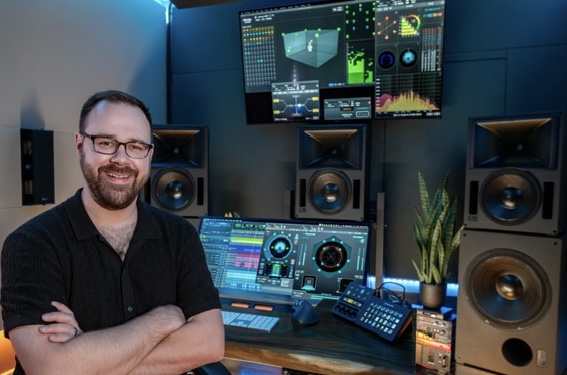Brand’s Plug-ins Boost Workflow and Amplify Creativity for the Nashville-based Engineer
NASHVILLE, TN ― Tracking and Mix Engineer Webster Tileston thrives when lending his expertise to the creative process — whether tracking in some of Nashville’s premiere recording studios, mixing at his own studio Axis Audio, system engineering or training personnel. Fueled by his fascination with cutting-edge technology and workflows, he began working in immersive formats, which led to his work with EDM artists Diplo and Dillon Francis, country artists Maren Morris and Little Big Town, and R&B artist Emily King, among others.

Webster Tileston in his studio with NUGEN Audio Plug-ins.
A veteran at tracking and mixing in stereo, Dolby Atmos for Apple Spatial Audio and Sony 360 Reality Audio, Tileston continuously strives to create moving and memorable experiences for listeners regardless of the playback format. To achieve this goal, he often turns to a variety of NUGEN Audio plug-ins, such as Halo Upmix, Paragon and Halo Vision.
An early adopter of immersive mixing, Tileston initially downloaded various plug-ins when he first began mixing for Dolby Atmos. “When Dolby Atmos was first being implemented, the integration of any plug-in for that application was a little challenging,” he says. “I revisited this later on, when I got my hands on NUGEN’s Halo Upmix, and it was nice to dive in and see how the technology has evolved. What I most appreciated was the functionality and simplicity of it. The user interface and metering functions are great. It’s easy to see how the energy is being distributed around the space and the speakers, and how you can work through all of that. Plus, the ability to go ‘under the hood’ and tweak a lot of the intricate settings is nice.”
Among Tileston’s favorite features of Halo Upmix are the vertical distribution sliders, specifically when working with stereo stems. “This comes in handy for me, especially if I’m doing an immersive mix from stems, and the stems have reverb baked into them,” he explains. “Halo Upmix has given me a very quick and easy way to push more of that ambience and reverb out and around the room, especially into the ceiling-height speakers.”
Tileston says that NUGEN’s Paragon reverb has also become one of his primary solutions. “Paragon is a great tool as well,” he adds. “Again, the layout of the user interface is very simple, yet still offers the ability to get technical when needed. It also has very similar metering to what is found in Halo Upmix, which is very convenient.
I also really love the way that you can easily navigate and filter using keywords to find different presets – this is super helpful in terms of workflow efficiency,” continues Tileston. “With Paragon, I can quickly manipulate things and the mic distance feature allows me to make things more spacious in a short amount of time. I want a plug-in that makes me not have to think about those elements, so I can really focus on the creative aspects rather than the technical. That’s exactly what Paragon does for me.”
Tileston is also a fan of NUGEN’s Halo Vision plug-in. “The things that NUGEN has come up with to help visualize different aspects of immersive workflows are really cool; other plug-ins don’t have that feature,” he says. “I think there are a lot of newer engineers in immersive audio who don’t necessarily pay attention to or know how important phase correlation is across that bandwidth and spectrum. Once you understand that importance, you’ll appreciate how awesome it is to have visual feedback like the correlation web within Halo Vision.”
When discussing the NUGEN solutions in general, Tileston expresses his gratitude for the functionality they provide. “I think NUGEN does a really good job of streamlining the user interfaces to make them very clear, concise, easy and quick to use. For the power users who do want to dig deeper and make it a little bit more configured, there is the ability to go down more to the core of things, which I really value.”
For more information about NUGEN Audio products, visit: https://nugenaudio.com.
